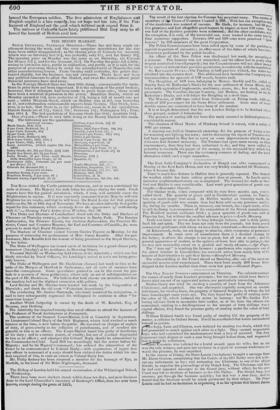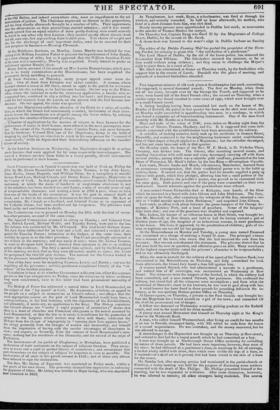The OLD BAILEY SESSIONS commenced on Thursday. The calendar contains
the names of nearly three hundred prisoners ; but the cases which have been hi- therto tried are not of an aggravated nature, nor particularly interesting. Martha Geary was tried for stealing a quantity of linen from the Athenmusi Club-house, and acquitted. She was afterwards capitally arraigned on another indictment, for stealing linen, the property of General Stapleton, to whom she had been housekeeper some years ago. The Jury found her guilty of stealing under the value of 5/., which reduced the crime to larceny : but Mr. Justice Park having advised them to reconsider their verdict, as at the time the offence was committed, stealing in a dwelling-house to the amount of forty shillings was a capital offence, they found the prisoner guilty of stealing under the value of forty shillings. William Richard Smith was found guilty of stealing 45/. the property of his master, a solicitor in Oxford Street. It will be recollected that Smith surrendered himself to justice. wo boys, Lane and Clayton, were indicted for stealing two fowls, which they tad proceeded to match against each other in a fight. T hey seemed respectable oys, who had committed the misdemeanour from a love of mischief. The Jury expressed their disgust at such a case being brought before them, and requested that it mieht be withdrawn. ames ummins was indicted for a brutal assault upon his wife; but as she was the only witness and gave her evidence in a spirit of extreme tenderness to- wards the prisoner, witness, was acquitted.
In the course of Friday, Sir Peter Laurie (we believe) brought a message front Mr. Baron Garrow, complaining that the Courts of the Old Bailey were left with- out any indictments to try ; and entreating the Chairman, as one of his oldest friends, to expedite the proceedings of the Grand Jury. The Chairman said that lie had sent repeated messages to the Grand Jury, without effect, for his own Court was left as destitute of business as the Old Bailey. The Grand Jury, last sessions, got through the business quickly ; but this wasa slow Jury, and he feared that the Sessions would be much protracted by their delays. Sir Peter Laurie said he had no hesitation in expressing it as his opinion that Grand Juries 7e Old Bailey, and indeed everywhere else, were an impediment to the ad- einistratien of justice. The Chairman expressed no dissent to this proposition, and the Jury shortly afterwards brought in a number of bills. Their appearance, after the observations on their proceedings, excited attention ; and it was unani- mously agreed that an equal nuniber of more portly-looking men could scarcely be found in any other city than London ; they seethed mostly about sixteen stone aad all, save one, fast approaching their sixtieth year. This choice of weight and ase, for the discharge of such important duties, went far to account for their slow progress in business.—Morning Chronicle.
At the Middlesex Sessions, on Monday, James Mawby was indicted for con- spiring with William Jonathan Fisher to procure the imprisonment of John Beasly, OD a false charge of debt ; but as it appeared that the William Jonathan Fisher of the case was a non-entity, Mawby was acquitted. Beasly- intends to prefer an indictment against Mawby alone. Henry Jarvis, accused of the assault on Miss Louisa Dannenberger, which gave rise to so many examinations at the Mansionhouse, has been acquitted the prosecutrix being unwilling to proceed. At these Sessions, on Thursday, many pauper appeal cases were de- cided. One of them from Islington Wit,; rather curious. A woman, whose husband rented a house at 301. there, meant to apply to the parish for assistance to get hen into the asylum, as he had become lunatic. On her way to the Police- nffice, where she intended to make the necessary application, a beadle, who ac- companied her, contrived to slip a shilling into her hand ; and then procured an order for her removal from the parish, on the ground that she had become bur- densome. On her appeal, the order was quashed.
One of the Magistrates called the attention of the Court to a series of resolu- tions, to which the Bench had unanimously assented, declaratory of their inten- tion to lessen the immoderate use of spirits among the lower orders, by refusing to increase the number of lincensed gin-shops. .43iiimber of applications by the masters of tiiverns to have licences for the 'performance of music in their houses, were refused in the most peremptory man- ner. The owner of the Southampton Arms, Camden Town, was more fortunate than his brethren ; Colonel Bird, one of the Magistrates, being in the habit of dropping inn, and having no objection to enjoy in his own per-son the " concord of sweet sounds," while he deprecated their demoralizing influence on the humbler classes of society.
At the London Sessions on Wednesday, the Magistrates thought fit to refuse music licences that were applied for by some respectable tavern-keepers. The want of a licence' renders them liable in a heavy penalty, should instrumental music beperformed in their houses.



















 Previous page
Previous page